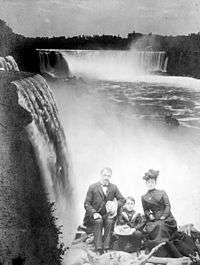May Mann Jennings



May Austin Elizabeth Mann Jennings (April 25, 1872 – April 25, 1963) was the First Lady of Florida as wife of Florida Governor William Sherman Jennings. She was one of Florida's most powerful and influential women.
Early years
May Mann was born in the Centerville section of Bayonne, New Jersey. Her parents moved to Crystal River, Florida in 1874[1] where her father, Austin Mann, was elected to the Florida Senate. Her mother died in 1882 when she was 9, and her father sent May and her older sister away to St. Joseph Academy in St. Augustine, Florida. The children spent vacations with their father in Tallahassee when the Legislature was in session. May was very bright and learned everything she could about people, politics and the Capitol. She graduated valedictorian of her class in 1889. Austin Mann ran for the state House of Representatives and May assisted in the campaign, hosting teas and talking with people at rallies.[2]
Marriage
Mann met Hernando County Judge William Sherman Jennings at her father's home near Brooksville, and a courtship began.[3] May's father won the election and when the legislative session began in January, 1891, May went to Tallahassee to serve as her father's aide, with responsibility for her father's appointments, correspondence and hosting social events.[2] Williams Jennings came to Tallahassee and the courtship continued. Judge Jennings married May Mann on May 12, 1891 and they were escorted down the aisle by the full legislative membership.[2]
The newlyweds lived in Brooksville in the William Sherman Jennings House. Her husband was elected to the Florida legislature in 1893 and became Speaker of the House in 1895. The couple had one child, a son, Sherman Bryan Jennings. William then ran for and was elected governor in 1900. Many credit his meteoric rise in the state Democratic Party to May's extensive knowledge of state politics and politicians and her vast network of Florida Federation of Woman's Club members.[2]
They moved to Tallahassee for four years in the governor’s mansion in 1901. Following her husband’s term as governor, the couple moved to Jacksonville, then Florida’s largest city, where he established a successful law practice. They divided their time between a home in Jacksonville and a farm and timber holdings in Clay County near Middleburg. [4]
Civic work
Jennings was an organizer of the Duval County Federation of Women's clubs and was president of the Florida Federation of Women's Clubs.[3] She used that network of motivated women to fight for issues including environmental conservation, child welfare, Women's suffrage, the State Library of Florida in Tallahassee, reservations for the Seminoles, the establishment of compulsory education, stock fence laws, and state parks. Club women across the state worked in campaign drives, lobbied legislators and appealed to other organizations for assistance.[5]
After she was widowed in 1920, she was co-founder of the Florida State League of Women Voters.[6] She campaigned and spoke for prohibition, better treatment of children and prisoners, education reforms and funding, improvements in public welfare, historic preservation and highway beautification.
She died on April 25, 1963.
Legacy
She was known as the "Mother of Florida Forestry" for her part in promoting and securing the legislative act that created the Florida State Board of Forestry,[3] known today as the Division of Forestry. According to Ruthanne Vogel of the University of Miami, "She was...instrumental in the development of Royal Palm State Park near Homestead," later donated to the National Park Service and incorporated into Everglades National Park.[3]
Honors
- In 1929, Stetson University awarded her an honorary Doctor of Laws for her tireless civic and political work for a dozen worthy causes.[1]
- Was named by the Lakeland Ledger as one of the most important Floridians of the 20th century.
- May Mann Jennings was designated a Great Floridian by the Florida Department of State in the Great Floridians 2000 Program. A plaque attesting to the honor is located at the Jennings House in Brooksville.[7] In 2008, she was also honored as a Great Floridian in the revived program.[5]
- May Mann Jennings Park, a 33-acre (130,000 m2) City of Jacksonville-owned park located in the north part of the city, is named in her honor. It opened in 1940. [8]
- May Mann Jennings Hall at the University of Florida was named in her honor in 1962.[9]
References
- 1 2 State of Florida, Division of Historical Resources: First Families of Florida-Mansion Life
- 1 2 3 4 Florida Times-Union: April 9, 2003-Wife turns into a good politician by Mary Jo McTammany
- 1 2 3 4 Florida International University: Reclaiming the Everglades-May Mann Jennings
- ↑ My Clay Sun: October 11, 2007-W.S. Jennings' name became part of Liberty ship lore
- 1 2 Florida Department of State: March 14, 2008-2008 Great Floridians
- ↑ Carver, Joan S. "First League of Women Voters in Florida: Its Troubled History." The Florida Historical Quarterly 63, no. 4 (1985): 383-405. http://www.jstor.org/stable/30152979
- ↑ Florida Department of State: Great Floridians 2000 Program
- ↑ City of Jacksonville: Recreation & Community Services-May Mann Jennings Park
- ↑